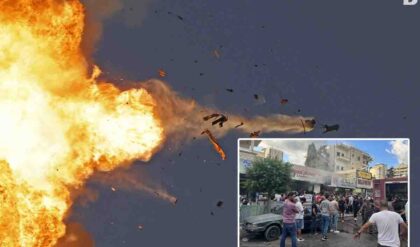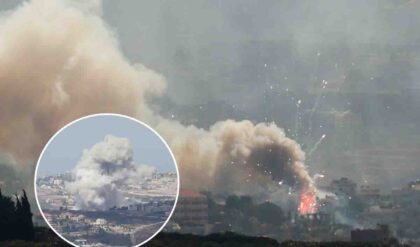Yesterday’s events read as if they were right out of a military-political pulp thriller. The peculiar and poorly executed attempt to oust increasingly powerful President Erdogan fizzled as fast as it had begun. Now the world wakes up to a Turkey that is far less stable and whose future is far less certain than it seemed 24 hours ago.
Make sure to read our rolling coverage of the coup attempt from yesterday for full context.
 BULENT KILIC/AFP/Getty Images
BULENT KILIC/AFP/Getty Images
Last night ended with Erdogan giving a scathing speech in front of thousands of supporters at Ataturk Airport. In it, he vowed to purge the military of anti-regime elements. Such a move is not new to Erdogan, having done so as recently as 2012, and experts warned of the need to do so again just last May.
We are now finding that this coup was largely orchestrated using encrypted smart phone chat app Whatsapp. This was reportedly the primary form of communication among coup participants. At the same time, Erdogan’s administration used smart phone tech in a massive way to counter the military coup. Not only did Erdogan use FaceTime to speak to his constituents in the hours immediately after the coup began, telling his supporters to fill the streets and stand up against the military’s power-grab attempt, but the government also sent out millions of SMS emergency text messages to everyone in population centers telling them to do the same.
 AP
AP
Erdogan’s call to his supporters to disobey the military’s evocation of martial law and their demand for people to stay inside was the largest factor in Erdogan’s political and possibly physical survival. All this underscores how powerful non-traditional forms of electronic communication have become during major geo-political and military conflicts.
As far back as the Iranian Presidential Election protests of 2009 and the Arab Spring that followed, smart phones and social media played a big role in putting collective frustration to work against the prevailing government power with unprecedented efficiency. But yesterday’s coup attempt seems to be the first time two opposing government factions used the technology as primary forms of communication, and frankly, as weapons.
 AP
AP
Meanwhile, the current toll from last night’s events includes 265 killed, over 2,800 arrested and roughly 1,440 wounded. The arrests are mainly made up of soldiers and officers that were involved with the coup. Yet not all were willing to surrender. One Turkish Black Hawk full of officers has defected to Greece, while it is also reported that the Turkish frigate TCG Yavuz has been seized by pro-coup naval officers. The head of the Turkish Navy and the Turkish Air Force are also said to be held captive.
As the aftershocks of the coup attempt continue, Turkey cut power to and closed the airspace around Incirlik Air Base, a major outpost for American air power—much of which is participating in the air campaign against ISIS in Syria and Iraq. This has resulted in the cessation of coalition air operations out of the base. The closure supposedly has to do with the Turkish Government’s lack of confidence in exactly who is controlling the Turkish Air Force.
 Gokhan Tan/Getty Images
Gokhan Tan/Getty Images
As this erratic situation in Turkey stabilizes the winners and losers of this event will become clearer, although it is safe to say that Erdogan is the biggest winner on multiple levels. He now has been legitimized outside the voting booth on a massive scale and after more than a decade of slowly consolidating power, he will now be able to continue doing so with ease. Also, that purge of the military he wanted, well now he can do it at zero political risk.
The military, who has enforced constitutionality of past governments in Turkey since the time of Ataturk, will now be severely weakened and the integrity of the institution overall questioned. This could greatly effect future military cooperation and arms deals. Especially in question is Turkey’s status as F-35 program partner. Delivering such a sensitive and advanced weapon system to an air force that is not even fully loyal to its civilian leadership is troubling, especially seeing as Turkey’s aerial weaponry was used against its own population last night.
 AP
AP
There have been strong voices calling for Turkey to be dropped from NATO for some time, and last winter when a Turkish F-16 shot down a Russian Su-24 for only breaching Turkish airspace for seconds, those voices increased in number and volume. But now, after this great show of instability, those calls will only grow stronger. Any weakening of the NATO alliance benefits Vladimir Putin more than anyone else, whose greatest aspiration is to break-up the 67 year old alliance, and any other type of pan-European unity for that matter.
Turkey’s tourism economy, which has already taken a massive toll follow multiple terror attacks, and especially after the attack on Ataturk International Airport just a few weeks ago, will likely be gutted following this unforeseen and quite deadly coup attempt. This will effect Turkey’s ability to fund its own priorities, including its fight against extremist elements, which includes the PKK, a group whose military offshoots are fighting alongside the US in Syria, as well as ISIS, al Qaeda, al Nusra and other terror groups.
 Stringer/Anadolu Agency/Getty Images
Stringer/Anadolu Agency/Getty Images
As for what comes next, Erdogan has called for his supporters to fill the streets again tonight. Obviously this was the most effective tool for blunting last night’s coup operation, so the fact that he is calling for it again shows that the regime is not totally confident that they have the situation fully under control.






